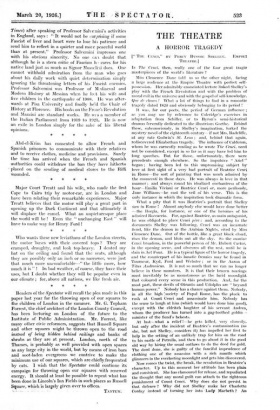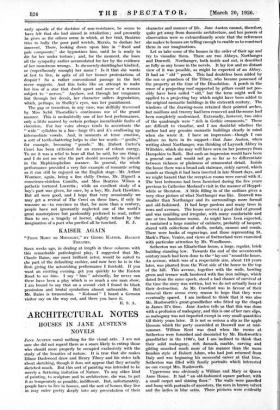THE THEATRE
A HORROR TRAGEDY [" THE CENCI," BY PERCY BYSSHE SHELLEY. KEPI= THEATRE.] Is The Cenci, then, really one of the four great tragic masterpieces of the world's literature ?
Miss Clemence Dane told us so the other night, facing a large audience at the Empire Theatre with perfect self- possession. Her admirably enunciated lecture linked Shelley's play with the French Revolution and with the problem of moral evil in the universe and with the gospel of self-knowledge. Que de chores ! What a lot of things to find in a romantic tragedy dated 1820 and obviously belonging to its period !
It was, for our poets, the period of German influence ; as you may see by reference to Coleridge's exercises in adaptation from Schiller, or to Byron's semi-historical dramas fervently dedicated to the illustrious Goethe. Behind these, subconsciously, in Shelley's imagination, lurked the mystery novel of the eighteenth century—if not Mrs. Radcliffe, at any rate Godwin's Si. Leon ; and, behind that again, rediscovered Elizabethan tragedy. The influence of Calderon, whom he was earnestly reading as he wrote The Cenci, need not be considered, except in so far as it may have led him to long speeches. But for those, unfortunately, there were precedents enough elsewhere. So the impulsive " Ariel " began ; having been led to this unpromising subject by love at first sight of a very bad portrait of Beatrice Cenci in Rome—the sort of painting that was much admired by the conoscenti in those days. He was always- in love in that
manner ; and always round his idealized enchantress of the hour—Emilia Viviani or Beatrice Cenci or, more perilously, Jane Williams—he cast the veil of his verse. This is the only instance in which the inspiration took dramatic form.
What a pity that it was Beatrice's portrait that Shelley Saw in Rome ! Almost anybody else' would hive done better —the Borgia, for instance, or one of the heroines of his admired Boccaccio. For, against Beatrice, as main antagonist, he was obliged to place Cenci rQre ; and, according to the documents Shelley was following, Cenci was an incarnate fiend, like the demon in the Arabian Nights, cited by Miss Clemence Dane. Out of the bottle, like a great black cloud, rises the demon, and blots out all the sky. So the maniac Cenci broadens, in the powerful person of Mr. Hubert Carter, in the opening scene, and obscures all the rest, until he is slain in Act Four. He is a typical figure of the horror tragedy, and the counterpart of his lunatic frenzies may be found in Tourneur, Kyd, Ford and Webster ; or in the Aaron of Titus Andronicus. It is not so much that we can no longer believe in these monsters. It is that their brazen roarings must inevitably be as monotonous as the lurid moonlight that coloured every scene in this production. And, for the most part, these devils of Otranto and Udolpho are " beyond human power." Nobody has a chance against them. Nobody, in all the high :society of Papal Rome, has the pluck to rush at Count Cenci and assassinate him. Nobody has the sense to laugh at him (which would have done him good), except with the eldritch laughter of his servant Andrea, whom the producer has turned into a gag-toothed goblin— minister of the fiend's behests.
At last—what a relief !—lie gets killed, very clumsily, but only after the incident of Beatrice's contamination (as she, but not Shelley, considers it) has impelled her first to help in the setting of an unlikely trap for him on the road to his castle of Petrella, hnd then to go about it in the good old way by hiring the usual outlaws to do the deed for gold. The deed done, she, is guilty of the fanciful imprudence of clothing one of the assassins with a rich mantle which glimmers in the everlasting moonlight and gets him discovered.
Now comes the twist, the break, the revolution in Beatrice's character. Up to this moment her attitude has been plain and consistent. She has clamoured for release, and repudiated the thought that any moral guilt can attach to the righteous punishment of Count Cenci. Why does she not persist in that defence ? Why did not Shelley make her Charlotte Corday instead of turning her into 'Lady Macbeth ? An early apostle of the doctrine of non-resistance, he seems to have felt that she had sinned in retaliation ; and presently he gives us the odious scene in which, at her trial, Beatrice tries to bully the poor paid wretch, Marzio, to declare her innocent. There, looking down upon him in " fixed and pale composure," she hypnotizes him, until he is ready to die for her under torture ; and, for the moment, she loses all the sympathy earlier accumulated for her by the evidence of her monstrous wrongs. Is she merely shielding her kindred, or (superfluously enough) her name ? Is it that she wants at last to live, in spite of all her former protestations of despair ? So a rather conventional passage in the last scene suggests. And this looks like an attempt to make her less of a star that dwelt apart and more of a woman subject to " nerves." Anyhow, not through her vengeance but through her deceit, her character suffers degradation, which, perhaps, in Shelley's eyes, was her punishment.
The gap or transition, in any case, was skilfully traversed by Miss Sybil Thorndike's continuous use of the grand manner. This is undoubtedly one of her best performances, only a little marred by certain perhaps ineradicable faults of elocution. For her voice always tends to accentuate the " wide " syllables in a line—large O's and A's swallowing up intermediate vowels. And, in moments of tense emotion, a sort of teeth-chattering helps to slur her words--" gentle," for example, becoming " gentile." Mr. Hubert Carter's Cenci has been criticized for an excess of robust energy. To me it was a relief to hear all that he said, for one thing ; and I do not see why the part should necessarily be played in the Mephistophelian manner. In general, the whole performance provided a very fair example of romantic acting as it can still be enjoyed on the English stage—Mr. Arthur Wontner, again, being a fine chilly Orsino, Mr. Hignett a conscience-stricken Camillo, and Miss Beatrice Wilson a pathetic tortured Lucretia ; while an excellent study of a boy's part was given, for once, by a boy, Mr. Jack Hawkins. But all were good, and I hope that very occasionally we may get a revival of The Cenci on these lines, if only to reassure us—to convince us that, for more than a century, people have not ignorantly neglected one of the world's great masterpieces but pardonably preferred to read, rather than to see, a tragedy of horror, slightly refined by the imagination of a poet who purified all he touched. R. J.



























































 Previous page
Previous page